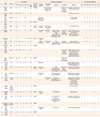3. Pettersson AF, Olsson E, Wahlund L-O. Motor function in subjects with mild cognitive impairment and early alzheimer's disease. Dement Geriatr Cogn Disord. 2005; 19(5-6):299–304. DOI:
10.1159/000084555.

4. Winblad B, Palmer K, Kivipelto M, Jelic V, Fratiglioni L, Wahlund L-O, et al. Mild cognitive impairment-beyond controversies, towards a consensus: report of the international working group on mild cognitive impairment. J Intern Med. 2004; 256(3):240–246. DOI:
10.1111/j.1365-2796.2004.01380.x.
5. National Health Insurance Service. Mild cognitive impairment which is the pre-phase of dementia, the number of patients has increased by 4.3 times in recent 5 years [Internet]. Seoul: National Health Insurance Service;2015. cited 2018 January 2. Available from:
https://www.nhis.or.kr/bbs7/boards/B0039/14982.
6. Ellison J, Harper D, Berlow Y, Zeranski L. Beyond the “c” in mci: noncognitive symptoms in amnestic and non-amnestic mild cognitive impairment. CNS Spectr. 2008; 13(1):66–72. DOI:
10.1017/S1092852900016175.

7. Brenowitz WD, Kukull WA, Beresford SA, Monsell SE, Williams EC. Social relationships and risk of incident mild cognitive impairment in US alzheimer's disease centers. Alzheimer Dis Assoc Disord. 2014; 28(3):253–260.

8. Manly JJ, Tang MX, Schupf N, Stern Y, Vonsattel JPG, Mayeux R. Frequency and course of mild cognitive impairment in a multiethnic community. Ann Neurol. 2008; 63(4):494–506. DOI:
10.1002/ana.21326.

9. Clare L, Woods B. Cognitive rehabilitation and cognitive training for early-stage alzheimer's disease and vascular dementia. Cochrane Database Syst Rev. 2003; 4:CD003260. DOI:
10.1002/14651858.CD003260.

10. Hong YJ, Jang EH, Hwang J, Roh JH, Lee JH. The efficacy of cognitive intervention programs for mild cognitive impairment: a systematic review. Curr Alzheimer Res. 2015; 12(6):527–542. DOI:
10.2174/1567205012666150530201636.

11. Simon SS, Yokomizo JE, Bottino C. Cognitive intervention in amnestic mild cognitive impairment: a systematic review. Neurosci Biobehav Rev. 2012; 36(4):1163–1178. DOI:
10.1016/j.neubiorev.2012.01.007.

12. Hill NT, Mowszowski L, Naismith SL, Chadwick VL, Valenzuela M, Lampit A. Computerized cognitive training in older adults with mild cognitive impairment or dementia: a systematic review and meta-analysis. Am J Psychiatry. 2016; 174(4):329–340. DOI:
10.1176/appi.ajp.2016.16030360.

13. Jeong PY, Sung JE, Sim HS. Meta-analysis of cognition-focused intervention for people with mild cognitive impairment and dementia. Commun Sci Disord. 2014; 19(2):199–212. DOI:
10.12963/csd.14122.

14. Li H, Li J, Li N, Li B, Wang P, Zhou T. Cognitive intervention for persons with mild cognitive impairment: a meta-analysis. Ageing Res Rev. 2011; 10(2):285–296. DOI:
10.1016/j.arr.2010.11.003.

15. Lezak MD, Howieson DB, Bigler ED, Tranel D. Neuropsychological assessment. 5th ed. UK: Oxford University Press;2012.
16. Littell JH, Corcoran J, Pillai V. Systematic reviews and metaanalysis. New York: Oxford University Press;2008.
17. Schulz KF, Grimes DA. Allocation concealment in randomised trials: defending against deciphering. Lancet. 2002; 359(9306):614–618. DOI:
10.1016/S0140-6736(02)07750-4.

18. Higgins JPT, Green S. Cochrane handbook for systematic reviews of interventions version 5.1.0 [Internet]. UK: The Cochrane Collaboration;2011. cited 2018 March 5. Available from:
http://handbook-5-1.cochrane.org.
19. Richard L, Strub F, William B. Rehabilitation team of Pusan National University. The mental status examination in neurology. 4th ed. Philadelphia, PA: F.A. Davis Company;2000.
20. Cohen J. Statistical power analysis for the behavioral sciences. 2nd ed. USA: Lawrence Erlbaum Associates;1988. p. 400.
21. Egger M, Smith GD, Schneider M, Minder C. Bias in meta-analysis detected by a simple, graphical test. BMJ. 1997; 315(7109):629–634. DOI:
10.1136/bmj.315.7109.629.

22. Bahar FA, Clare L, Woods B. Cognitive training and cognitive rehabilitation for mild to moderate alzheimer's disease and vascular dementia. Cochrane Database Syst Rev. 2013; 6:CD003260. DOI:
10.1002/14651858.CD003260.pub2.
23. Braver TS, Satpute AB, Rush BK, Racine CA, Barch DM. Context processing and context maintenance in healthy aging and early stage dementia of the alzheimer's type. Psychol Aging. 2005; 20(1):33–46. 10.1037/0882-7974.20.1.33.

24. Lampit A, Hallock H, Valenzuela M. Computerized cognitive training in cognitively healthy older adults: a systematic review and meta-analysis of effect modifiers. PLoS Med. 2014; 11(11):e1001756. DOI:
10.1371/journal.pmed.1001756.

26. Ritchie K, Artero S, Touchon J. Classification criteria for mild cognitive impairment a population-based validation study. Neurology. 2001; 56(1):37–42. DOI:
10.1212/WNL.56.1.37.
27. Hoefler CE. Computer-based cognitive training and alzheimer's disease: a meta-analysis [dissertation]. Winona, Minnesota: Saint Mary's University of Minnesota;2016. 1–50.
28. Fernandez BR, Zamarron MD, Tarraga L. Learning potential: a new method for assessing cognitive impairment. Int Psychogeriatr. 2005; 17(1):119–128. DOI:
10.1017/S1041610205000992.





 PDF
PDF ePub
ePub Citation
Citation Print
Print







 XML Download
XML Download